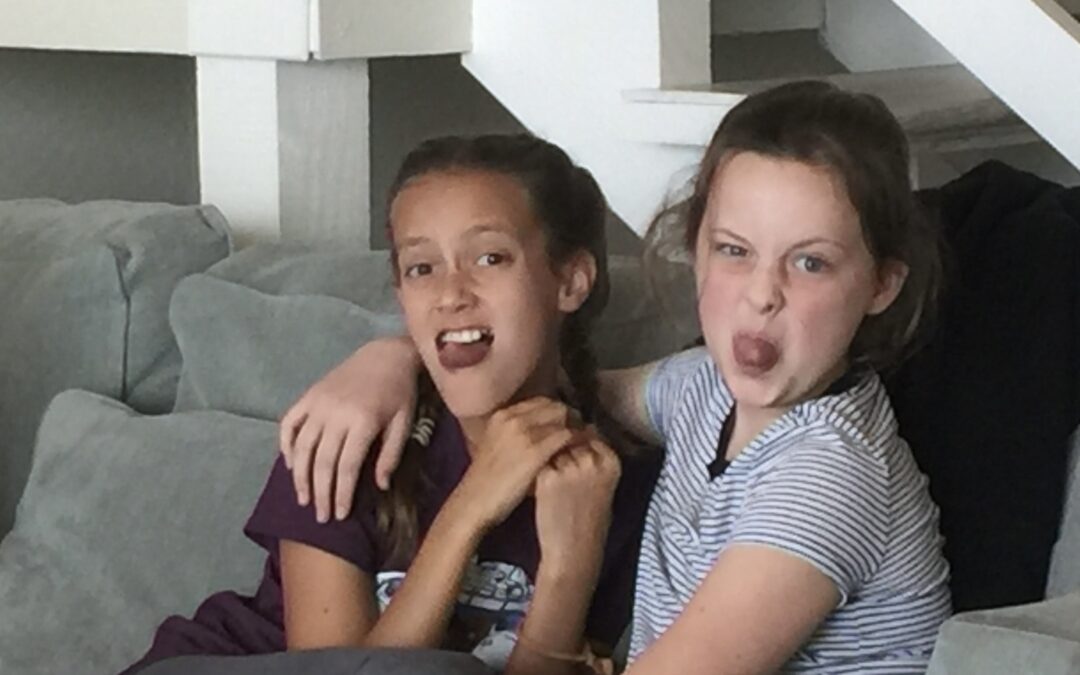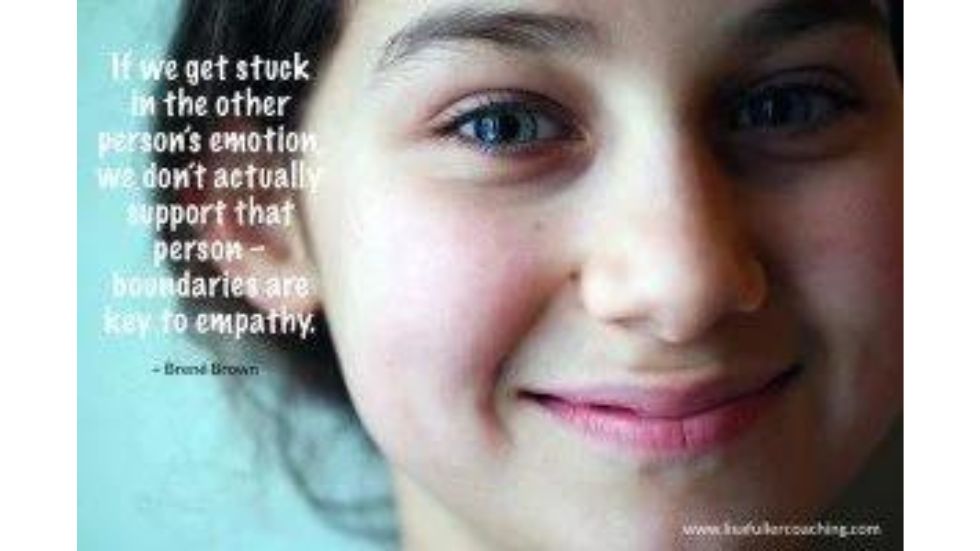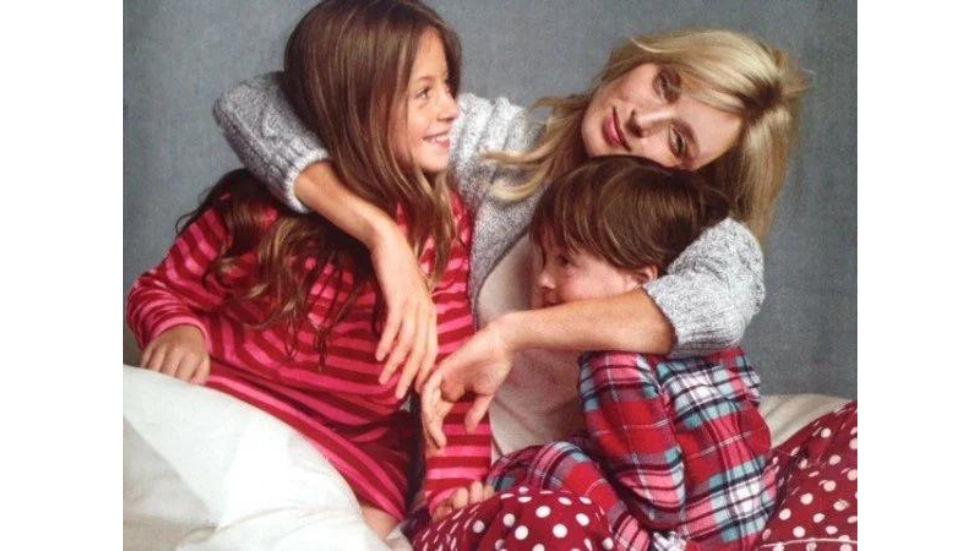
by Lisa Fuller | Feb 27, 2023 | Communication, Connection & Love, Feelings & Emotions, General, Parenting, Self-regulation, teenager
At the end of a recent evening talk, a woman came up and said, “Eighty percent of my relationship with my twelve-year-old daughter is amazing. We’re close and connected, but there’s one thing I’d like to run by you.” Lifting her eyebrows, she confessed, “My daughter’s embarrassed by me!”
The woman continued, “I mean, when I was her age I was embarrassed by my mom, but that was different because my mom WAS embarrassing!”
She rolled her eyes at the irony and we both smiled.
I reassured her, “Your daughter’s embarrassment is normal, and it’s something I’ve experienced regularly from my own sixteen-year-old daughter in recent years. But I can almost promise you she will outgrow it. The best thing you can do is have a sense of humor about it with yourself and with her. If you can hold her criticism lightly and keep laughing, she’ll experience you as a mom who’s strong and grounded in her self worth.
I’m no stranger to the pain and vulnerability that comes with parenting a young teen, so my advice for this parent stems from my continuing to move forward, ego bruises and all!
As I reflected on her question, I thought about how Gretchen Schmelzer describes how trust between parent and child is built through our “endless thereness”:
…. trust is built not because you are loved, but because someone loved you anyway. They loved you when you were angry, or messy, or cranky or a total and complete pain in the ass. They loved you when you forgot, or remembered—when you said it or when you didn’t say it. They didn’t love you because you could do it—they loved you anyway, even when you couldn’t.
As a parent, loving our child despite the hard times is what builds trust. This call for our endless thereness is one reason parenting is so challenging, but it is also why it has the potential to radically change us. Kids give us the opportunity to love another person not because they are always lovable, but because we’ve made the commitment to love them.
We’re there and love our child anyway when:
- we get yet another voice message alert that our child has cut class.
- we learn that our child lied to us about their plans.
- our child climbs on the dining table while we’re trying to share a family meal.
- our child is embarrassed by us, for no good reason 😣
We love them anyway.
Can you relate to this story? Do you have questions? It’s so supportive to know we are not alone! Please share in the comment below.
***. I’m offering an in-person (Sept12) and via Zoom (Sept 14) 7-week parenting series in the East Bay beginning Sept12 and and two 8-week Writing Circles, via Zoom, beginning August 25 & 29.

by Lisa Fuller | Apr 14, 2021 | Communication, Connection & Love, Feelings & Emotions, General, Power struggle, Self-care, Self-regulation, teenager
As I write today I’m reminded of a post I wrote 8 years ago, What I Did When My Daughter Said, “You’re the Boringest and I Hate You! This time, however, it’s not what she said, but instead what she didn’t say and didn’t do that shined a light on some difficult parenting wisdom.
Part I – The Sweater
It all began when I knit my 14 year old daughter a sweater. She’d accompanied me to the store to choose a soft, washable yarn in a neutral color she’d actually wear. During Covid I’ve picked up knitting again and found a healthy distraction in searching for patterns and scrumptious yarns. Because my grandmother taught me to knit when I was young, knitting sent a gentle signal to my brain, “Everything’s okay.”
A couple of weeks ago when I completed the sweater, I laid it on her bed so she’d see it when she got home. I imagined she’d try it on and show me how it fit. Over the past month I’d measured the length of her arms, inquired about how cropped she’d like it as that’s the current fashion and worked to tailor it just for her.
Because she never mentioned the sweater, I checked in with her in the afternoon, “Did you see the sweater? Please try it on — I’d love to see how it fits.”
She answered, “Not right now.”
Later I asked her again and she explained that she’d already changed into her pj’s but that she’d do it the next time she got dressed. The next day I decided to mention it one last time. My heart felt heavy. I didn’t want to get entangled in a power struggle with her over the sweater I’d made for her because I adore her. Needless to say, I never saw it on her.
Part II – The Pile
My daughter had recently cleaned out her room, placing all outgrown and unwanted items into a huge bag in the hall. Beside the bag was a loose pile of papers with a blue glue gun resting on top.
After a few days of watching the pile collect dust, I took a closer look and saw under the glue gun a photo storybook I’d created and given to her for her birthday some years ago.
This project, with a closeup of her soft two year old face on the cover looked to have seen better days. I picked it up and brought it into her room asking, “What’s happened to this?” She confirmed that she’d found it spoiled, likely because last fall she’d placed a little pumpkin from our garden on top of it, in a drawer. The pumpkin decomposed over the course of months.
I felt an anger rise in me and said, ‘You clearly don’t care about it.”
She answered, “I do care.”
I said, “If you cared you’d have come to me when you found it and asked what we could do.” I swore, “Just f***ing get rid of it then, but don’t leave it on the floor for me to take care of.”
Heart pounding, I retreated to my bedroom across the hall where I stood motionless, a little shocked that I’d spoken to her so harshly. Being the youngest child she was adept at avoiding conflict and I’d become more able to keep my cool.
For a split second I thought, I’m going to ignore her, give her the cold shoulder. A memory flashed from the recesses of my mind of my dad ignoring me for two weeks after his feelings had been hurt because I’d been spending weekends at my friend Sharon’s house. I can remember him scolding me as we stood inside our front door, “You care more about her family than you do your own!” I was in 5th grade at the time and it was two weeks before he looked at or spoke to me again.
I decided I wasn’t going to ignore her, even though to hurt her back felt like the “natural” response.
Returning to her room, disintegrating storybook in hand I said, “I realize the reason I’m so upset is that my feelings are hurt. It’s becoming clear to me that you don’t care about things I’ve made for you.”
I was of course thinking about the unadorned sweater.
I repeated myself, “It’s becoming clear to me, and I’m speaking to myself now, that I need to focus less on you and more on myself.”
I felt my voice catch and tears well in my eyes.
Unlike 8 years ago, this time she said nothing. Through the uncared for storybook and forgotten sweater I was getting a message loud and clear, “Mom, get a life. While I need you to be there for me, I don’t need you the same way I used to and I’m not going to act in ways to please you. You haven’t trained me to take care of you and I’m not going to start now. My main concern right now is my friends and all the changes I’m going through. You can’t use me to feel good about yourself.”
I felt grounded when I turned to leave her room, closing the door quietly behind me.
I haven’t figured it all out yet.
It felt valuable to write about and share with you because it’s not spit spat all settled in me and tied up with a bow and maybe you’re having your own messy parenting moments. I’m sitting with a real life collision between my daughter’s age appropriate growth and what I’m gently naming my age appropriate stuckness, a slice of difficult wisdom.
It’s not only children who grow. Parents do too. As much as we watch to see what our children do with their lives, they are watching us to see what we do with ours. I can’t tell my children to reach for the sun. All I can do is reach for it, myself.
— Joyce Maynard

by Lisa Fuller | Jan 29, 2015 | Communication, Connection & Love, Encouragement, General, Parenting
Q: As the mother of a middle school girl, I struggle to be empathetic without jumping on the roller coaster of her ever-changing moods, emotions and dramas. And, as a woman in her late 40s, my emotions are often a 6 Flags of hormonally-induced thrills, so staying detached feels nearly impossible at times
Recently my seventh grader tried out for the school musical. After a series of micro disappointments this Fall (not making the “A” soccer team, getting put into an advisory group without any good friends, being just slightly outside of the ‘cool’ group, etc.), she was serious about getting a good part for the show. She practiced her song with a singing teacher several times and felt good about it.
Several days went by while she waited for the cast list to be posted. I worked on shifting her language away from ‘good’ and ‘bad’ parts in the show, to some limited success. I wanted to support her enthusiasm but it was draining to stay positive given my fear of the potential bad news ahead.
This daughter can be fairly stoic, but when she saw the cast list, she ran up to her room and sobbed so loudly I was afraid she would choke.
After a few minutes of trying to let her release her disappointment on her own, I went in to check on her. With your thoughts of empathy fresh in my mind, I resisted the temptation to tell her the emotions would pass or it didn’t matter or that the part was probably better than she thought, blah, blah, blah.
Instead, I let her cry, supporting the wildly strong feelings raging through her. Unfortunately, it was just a matter of time before I was crying too, and then we were both sobbing at the injustice of the world (did I mention I am a pre-menopausal woman with raging emotions?)
I managed to get myself together and put her to sleep, but then I could not stop crying. I just felt so sad for her and could not put it away. It took all the strength I had not to email the drama teacher and ask her if there was any way to revisit the cast list. Which is just a simply INSANE thing to even think, let alone seriously consider!
So here’s my question: how can we support our children with their dreams, projects, efforts and goals (especially our daughters) without getting enmeshed in the outcome? How can we let our older children navigate the disappointments and challenges of life without getting sucked into the emotional turmoil that goes along with the journey? Where do you draw the line between empathy and over involvement/attachment?
A: First, Michelle, congratulations on your success in avoiding many of the common barriers to empathy. What you did was no small feat — staying out of judgement, taking her perspective and touching a place in yourself (maybe a bit too deeply) that understood her feelings.
Simply defined as “the ability to understand and share the feelings of another,” empathy is nuanced. While you were able share your daughter’s feelings, it proved difficult to pull yourself out.
To answer your question, here are my ideas to strengthen your empathetic response even more while simultaneously moving you out of the helicopter parenting zone altogether.
From Helicopter Parenting to Empathy
- Validate her feelings. In your story Michelle, you give nice examples of how you did this — letting her cry and stay in her feelings, etc.
- Resist the urge to fix. You write, I resisted the temptation
 to tell her the emotions would pass or it didn’t matter or that the part was probably better than she thought, blah, blah, blah. This is cause for celebration! When you’re done partying let’s look at what you describe your fear of the potential bad news that she didn’t get a “good” part. Your feeling of fear fuels your underlying belief that something needs to be fixed. You can do one of two things here, keep your fear AND bite your tongue, which
to tell her the emotions would pass or it didn’t matter or that the part was probably better than she thought, blah, blah, blah. This is cause for celebration! When you’re done partying let’s look at what you describe your fear of the potential bad news that she didn’t get a “good” part. Your feeling of fear fuels your underlying belief that something needs to be fixed. You can do one of two things here, keep your fear AND bite your tongue, which
you did, or, with the help of a friend, coach or therapist, internally shift your perspective from disappointment = bad to disappointment = opportunity for growth. (I’ll go into this more in my next post). What I’m suggesting is more than a surface shift — that’s why it requires support.
- Share your own story of disappointment. By sharing a simple one sentence story of a time you didn’t make the team or you weren’t invited to the party, you let your daughter know that she’s not alone and most importantly, that she belongs. (A sense of belonging in family is profoundly impactful to a child’s sense of well-being.) For example, I remember when I longed to be chosen to play the role of Mary in the church nativity, yet I wasn’t picked and I felt terribly sad. One sentence that’s it. I can hear parents ask “Isn’t there more to say than that?!” No — children are self focused, your goal here is to simply let them know you’ve been there — voila.
- Be present. It’s not what you say that will make a difference, but simply your presence, your ability to be with your child. Ground yourself in what’s most important to you, tuck your phone and other distractions away and like the Beatles so beautifully sang, let it be.
- Practice mindfulness. Mindfulness strengthens our ability to have boundaries which according to Brené Brown’s research is key to empathy. If we get stuck in the other’s emotion, we don’t actually support that person – boundaries are key to empathy.
One of the many gifts in your story is how fully engaged you are in your daughter’s life.
Thank you Michelle for sharing your story and question, deepening our understanding of empathy. I appreciate and honor your willingness to be vulnerable — it can feel scary to divulge our struggles when we’re “supposed to be” the all-knowing parent!
Are you wanting someone to walk you through a parenting challenge like the one that Michelle shared? If so, visit my schedule to find a time for us to meet via phone or Skype.
I know that parenting is important to you — it’s worth taking time for yourself, so that you can be the parent you want to be, even in your most challenging circumstances.
Take a moment to share in the comment section below how you relate to Michelle’s story and what you want to remember from today’s post.
If you haven’t already done so, join me on this journey!
Wanna talk? Schedule a time here.

by Lisa Fuller | Sep 23, 2014 | Encouragement, General, Parenting, Self-care
Years ago I read an interview with Susan Sarandon.
When asked if she missed the thrill of working in between jobs she said no, there’s nothing I’d rather do than spend time with my children. They’re the most fascinating people I know.
Can’t you just hear her saying that?
Although I read them years ago, her words (how I remember them) continue to cycle through my memory and with them comes more than a pang of inadequacy. She’s clearly an attentive, interested mother who’s produced spellbinding people to boot!
Don’t get me wrong. I couldn’t love my children more than I do – they are kind, cool, quirky, creative… downright good people.
Nonetheless, the image of the hip, engaged Sarandon mama has stuck with me. I don’t measure up. I’m not good enough.
When my second son was six, a friend he affectionately called his “God Brother,” invited him to camp on the beach in Hawaii for 10 days!
Sure we hesitated, it seemed dicey to have our child a stones’ throw from the ocean and so far away from us. But we trusted the parents, he was eager to go and we wanted to encourage his openness.
I was thrilled.
When we spoke with him on the phone he enthusiastically cheered that he was having the time of his life (his exact words).
Am I a good mother? How is it that I enjoy my little one being so far away – for so long?
Susan Sarandon has become a symbol for me – beyond Bull Durham and Thelma and Louise – she’s the uber interested mama who prefers the company of her children over her friends and her cool tribe of actor homies.
My fantasy continues… when Susan goes out to dinner with her kids, there’s no scuffle over devices because each family member is wrapped in titillating conversation or simply basking in each other’s company. Her kids prefer the company of their mom to friends (okay, Lisa now you’re just being silly).
Who’s your version of Susan Sarandon?
Is there someone you measure yourself against? Someone you use to judge yourself?
Maybe it’s your neighbor Jane whose kids always say thank you, their pearly whites shining through their gorgeous smiles.
Maybe it’s your cousin, the preschool teacher whose children abhor television and sugar and spend their days tending animals and making toys from scraps they find in the woods.
If you’re like me, you hold tightly to an idealized version of someone else as evidence to support an underlying angst that you’re not a good enough parent.
That sense of not enough pulls you away from the present moment.
I’ve no doubt that the mere act of becoming aware of your version of Susan Sarandon will go a long way to tame it. But what else can you do?
Remember my New Year’s invitation back in January? Some of you took me up on it and MANY of you wrote to say you thought it was a good idea.
Good ideas need action.
What’s one thing you LOVE about yourself as a parent?
What’s your specialty – reading bedtime stories? Being there for the neighborhood kids? Lightening up a tense moment with a perfectly timed joke?
Imagine if you spent a fraction of the time you do berating yourself for not living up to your Susan Sarandon, in taking stock of your positive qualities.
How would you feel? What might change?
Share right here and now: One thing, big or tiny that you do well as a parent. You deserve to take a moment to celebrate what works.
For kicks, share what it is about your ideal that “gets” you. That should provide some fun reading in the comments!
(If the website is getting in your way – send me an email – it can be one sentence or even one word!)
If you haven’t already done so, join me on this journey!
Wanna talk? Schedule a time here.

by Lisa Fuller | Dec 9, 2013 | General, Parenting
Images are powerful. Today’s mail included a Lands’ End catalogue with a cover photo that caught my eye: a mom lovingly sandwiched between her admiring tween daughter and four-year-old son, all three clad in their snuggly PJ’s.
Mom had an eggnog-induced, post-nap afterglow that made me wonder if she wasn’t the kids’ free-spirited Aunt Uma visiting from New Mexico who’d had a little extra something something just before the photo shoot.
I admit it, I want some of that “look” and the feeling of holiday contentment it implies.
So I wonder, is “relaxed Mom” available in a size large with express shipping?
It’s our tradition to celebrate Christmas and the truth is, what I really want more than anything, is to know that the holidays have been meaningful to my family beyond the gift-giving. I want to feel THAT kind of relaxed (and sure, a little bit of the other stuff wouldn’t be so bad either.)
Lands’ End promises that their pajamas will give you, “the Magical Moments of Christmas Mornings all Winter Long.” That seems like a tall order for a PJ and slipper set.
Instead, I’m going to offer two tips for a more enduring “Mom Glow”, and it won’t cost a dime. One tip pops you into action while the other invites you into presence.
Lisa’s “Holiday Glow” Tip #1: Discuss ‘together time’ with your family
This might sound like you’re adding more activities to your already packed schedule. But fear not. It’s about peeling away obligations and busy-ness to find experiences that are meaningful to your family.
Sometime in the next week pull your family together (e.g., during a car ride when everyone is captive) – and ask these two questions:
“What’s one thing you want to do with the family, during this holiday time?”
“What’s one thing you want to do alone or with friends during this holiday time?
This creates an intention for the time you have together so by the end of the holiday break you’ll feel less like “I don’t know where the time went” and more “Yes!….. that was just the holiday I desired … ! In other words, less frantic and more fulfilled.
I am not suggesting you agree to satisfy everyone’s wishes. But simply asking these questions shows your family you care and are interested in their desires. Even if the trip to Disneyland isn’t in the cards, deciding to go to the park together with hot cocoa and a blanket might be.
That’s a lot of potential activity to anticipate and coordinate, which leads me to my second holiday tip.
Lisa’s “Holiday Glow” Tip #2: Accept your imperfections
If you’re like many parents I know you catch yourself saying “what’s wrong with my kids – what’s wrong with me? My kids aren’t behaving and don’t listen to me.” Parenting is hard AND I know we make it harder on ourselves when we listen to our critical self-talk (about our kids and ourselves).
I’m asking you to do this:
Next time you catch yourself criticizing or comparing, take a step back, watch the berating and be both curious and gentle with yourself. In other words, notice your critical voice, but treat yourself as you would an admired friend, with openness and compassion.
So dear REAL parent, here’s my recipe for a relaxed holiday season:
Tip #1: Talk with your family about together time (beyond the shopping) and write ideas into the family calendar
Tip #2: Be kind to yourself/ Accept your imperfections
…and when in doubt, put on your (old, mismatched) PJs (in my case a soft t-shirt and sweats), gather your kids on the couch and hide the to-do list.
Who knows, maybe Aunt Uma will stop by after all.
CONSIDER⇔SHARE⇔ACT
What’s one thing you want to do with your family in the next few weeks?
What supports you to feel greater acceptance of yourself as a parent?





 to tell her the emotions would pass or it didn’t matter or that the part was probably better than she thought, blah, blah, blah. This is cause for celebration! When you’re done partying let’s look at what you describe your fear of the potential bad news that she didn’t get a “good” part. Your feeling of fear fuels your underlying belief that something needs to be fixed. You can do one of two things here, keep your fear AND bite your tongue, which
to tell her the emotions would pass or it didn’t matter or that the part was probably better than she thought, blah, blah, blah. This is cause for celebration! When you’re done partying let’s look at what you describe your fear of the potential bad news that she didn’t get a “good” part. Your feeling of fear fuels your underlying belief that something needs to be fixed. You can do one of two things here, keep your fear AND bite your tongue, which



